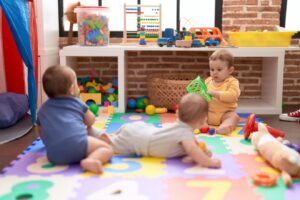
When it comes to early childhood education, numbers matter — but not in the way you might think. At Love2Learn Early Learning Center, we know that how many of children each teacher is responsible for directly impacts how deeply we can nurture, guide, and connect with every child.
That’s why, while state licensing sets minimum standards for teacher-to-child ratios, we believe our children deserve more than the minimum.
In Pennsylvania, the state allows one teacher to supervise as many as 10 three-year-olds at a time (Pennsylvania Code, 2024). While this meets regulatory requirements, it does not always meet the developmental needs of young children.
At three years old, children are blossoming — learning language, social skills, emotional regulation, and basic academic concepts — all at once. They need frequent, meaningful interactions with adults to thrive. In larger groups, it’s simply harder for teachers to give each child the focused attention they need and deserve.
Research shows that lower teacher-child ratios are linked to:
- Higher language development
- Better emotional support
- Stronger early literacy and math skills
- Fewer behavior challenges
- Happier, more confident children(National Institute for Early Education Research [NIEER], 2023; Burchinal et al., 2000)
In short: Better ratios create better outcomes.
At Love2Learn, we have made a deliberate choice to stay closer to a 1:6 teacher-to-child ratio for our three-year-old classrooms — significantly lower than the state minimum.
This allows us to:
- Form deeper bonds with each child
- Notice and nurture individual needs faster
- Encourage creativity and curiosity in a responsive way
- Support emerging social skills with gentle, attentive guidance
With fewer children per teacher, every child has the space and support to be seen, heard, and celebrated.
We believe that preschool isn’t just daycare — it’s the foundation for a lifetime of learning, confidence, and belonging.
At Love2Learn, we aren’t interested in just meeting state minimums. We’re committed to providing high-quality early childhood experiences that honor the importance of these precious early years.
Because your child deserves more than the minimum. They deserve a place where they are truly known and loved — every single day.
If you’re looking for a preschool where your child will receive personalized attention, joyful learning, and genuine care, we invite you to schedule a private tour of Love2Learn. Let us show you how smaller class sizes and higher standards make all the difference.
Schedule Your Tour Today!
References
Burchinal, M., Roberts, J. E., Riggins Jr, R., Zeisel, S. A., Neebe, E., & Bryant, D. (2000). Relating quality of center-based child care to early cognitive and language development longitudinally. Child Development, 71(2), 339–357.
National Institute for Early Education Research. (2023). The state of preschool 2023.
Pennsylvania Code. (2024). Title 55: Public Welfare § 3270.51. Child care ratios.




